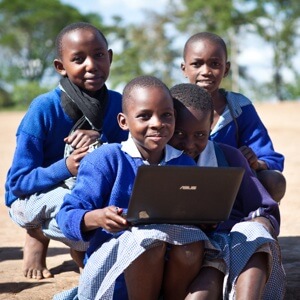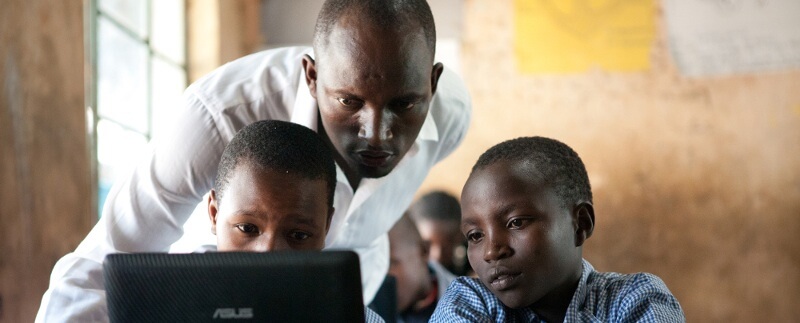 Schools on their way into 21st century
Schools on their way into 21st century
Computer classes for children in Tanzania
The class is silent. Mr. Mwanga is looking into 80 eyes full of expectation. Today, computer lessons are on the schedule. For the first time with real computers! Four pupils share one computer and they are awestruck. Mr. Mwanga is smiling. It is over a year ago that he first taught the children how to use a computer. He remembers that feeling of helplessness. The national curriculum dictates computer lessons, however, on his desk there were only a piece of chalk and a note pad. So he started, to draw a box onto the board. But how should the children understand what he is drawing? It is like learning to read – without books. Today the situation has changed for the first time. “This”, Mr. Mwanga is saying happily, “this is a computer”.
Necessity
IT infrastructure in schools
Activity
Schools are provided with hard- and software. Teachers are trained. Schools and teachers get long-term technical support.
Countable effort
Amount of pupils participating in computer lessons.
Result
Measurable increase of achievements in the final IT exams of the pupils and increase of the amount of pupils who find a job due to computer classes.
Systemic effect
Sustainably improved chances for education and work for future generations as well.
Background
Information and communication technologies (ICT) have impacted the global socio-economic and political developments immensely during the last decades. Institutions such as the World Bank and the UN believe in the potential of ICT to promote development and to revolutionize education systems (World Bank 2009, 2011; UNESCO 2005, 2007). ICT facilitates the access to information, where school libraries are missing. Information and communication technologies offer completely new options to visualize lessons with the help of photo and film material. Pupils are able to learn important competencies of the 21st century via lessons with ICT. Last but not least computer skills are important for the labor market. Graduates with respective knowledge have much higher chances to find jobs. In 2003 Tanzania has drafted a national ICT strategy plan followed by another strategy plan for the educational system in 2007 (URT 2003, 2007). The integration of ICT into the educational process is one of the goals of these guidelines in order to improve the academic development. However, most schools in Tanzania are not able to offer to their pupils what on a political level has long been declared to be goal and content of a proper education (URT 2011). The reasons are mainly a lack of resources of the pupils as well as non-existing providers for the specific needs. If this gap can be closed the pupils in Tanzania have real chances to profit from the positive effects of a globalized knowledge-based society and find ways out of their poverty via ICT.
The good deed
We actively and sustainably support schools to use information and communication technology in classes. With help from Germany schools are able to afford the necessary hard- and software, train teachers, and receive technological support. Through this complementary package for the usage of ICT in class the pupils get access to ICT and to ICT-education. The computer room is not only used for computer courses. With their digital education materials the computers provide a basis for a quality intensification in many other subjects as well.
Challenge
A particular challenge often lies in the lacking know-how of the school’s employees. This is why Viafrica not only equips the schools with hardware, but focuses especially on training the teachers and maintaining the machines. In so doing they ensure a functioning infrastructure and the existence of the necessary knowledge in order to use the computers in school.

AboutTanzania
Dodoma
Capital
44.928.923
Number of inhabitants
703 USD
Gross domestic product per capita per year
152
Human Development Index
Mount Kilimanjaro (5895m) is the highest mountain in Africa. Lake Tanganyika is the longest (700km) and second deepest (1450m) lake of the earth.
About the organization and further information
Association
Viafrica
Initiative Transparente Zivilgesellschaft




